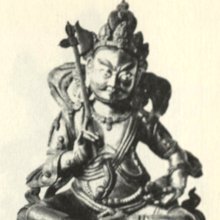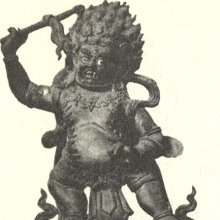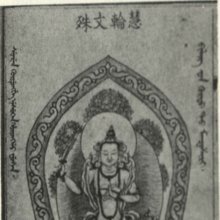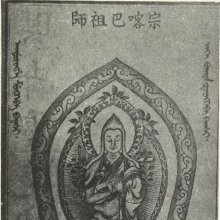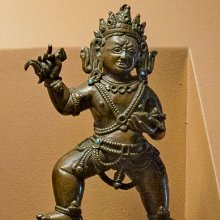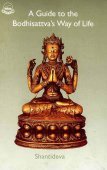Po, Pô: 8 definitions
Introduction:
Po means something in Hinduism, Sanskrit, the history of ancient India, biology, Tamil. If you want to know the exact meaning, history, etymology or English translation of this term then check out the descriptions on this page. Add your comment or reference to a book if you want to contribute to this summary article.
Images (photo gallery)
(+755 more images available)
India history and geography
Source: Cologne Digital Sanskrit Dictionaries: Indian Epigraphical GlossaryPo.—ṉ-bhaṇḍāram (ASLV), a treasurer; treasury. Note: po is defined in the “Indian epigraphical glossary” as it can be found on ancient inscriptions commonly written in Sanskrit, Prakrit or Dravidian languages.
--- OR ---
Po.—ṟ-Bhaṇḍāri (EI 25), Tamil; temple officer mentioned along with Śāsana-bhaṇḍāri (Ep. Ind., Vol. XXV, p. 132); cf. pora prefixed to Od8iyā official designations like Pora-Śrīkaraṇa; also Tamil Poṟṟu. Note: po is defined in the “Indian epigraphical glossary” as it can be found on ancient inscriptions commonly written in Sanskrit, Prakrit or Dravidian languages.
--- OR ---
Pŏ.—ṉ-vari (SII 12), a tax. Note: pŏ is defined in the “Indian epigraphical glossary” as it can be found on ancient inscriptions commonly written in Sanskrit, Prakrit or Dravidian languages.
--- OR ---
Po.—ṉ, Tamil; see pon. Note: po is defined in the “Indian epigraphical glossary” as it can be found on ancient inscriptions commonly written in Sanskrit, Prakrit or Dravidian languages.

The history of India traces the identification of countries, villages, towns and other regions of India, as well as mythology, zoology, royal dynasties, rulers, tribes, local festivities and traditions and regional languages. Ancient India enjoyed religious freedom and encourages the path of Dharma, a concept common to Buddhism, Hinduism, and Jainism.
Biology (plants and animals)
Source: Google Books: CRC World Dictionary (Regional names)Po in Ivory Coast is the name of a plant defined with Celtis mildbraedii in various botanical sources. This page contains potential references in Ayurveda, modern medicine, and other folk traditions or local practices It has the synonym see J.H. Barnhart, Biographical Notes upon Botanists. 2: 489. 1965 (among others).
Example references for further research on medicinal uses or toxicity (see latin names for full list):
· Botanische Jahrbücher für Systematik, Pflanzengeschichte und Pflanzengeographie (1909)
If you are looking for specific details regarding Po, for example pregnancy safety, side effects, diet and recipes, health benefits, chemical composition, extract dosage, have a look at these references.

This sections includes definitions from the five kingdoms of living things: Animals, Plants, Fungi, Protists and Monera. It will include both the official binomial nomenclature (scientific names usually in Latin) as well as regional spellings and variants.
Languages of India and abroad
Sanskrit dictionary
Source: DDSA: The practical Sanskrit-English dictionaryPo (पो).—a. Pure, clean.
Source: Cologne Digital Sanskrit Dictionaries: Monier-Williams Sanskrit-English DictionaryPo (पो):—([nominative case] pauḥ), [from] [Nominal verb] pāvaya, [Pāṇini 1-1, 58], [vArttika] 2, [Patañjali]
[Sanskrit to German]
Sanskrit, also spelled संस्कृतम् (saṃskṛtam), is an ancient language of India commonly seen as the grandmother of the Indo-European language family (even English!). Closely allied with Prakrit and Pali, Sanskrit is more exhaustive in both grammar and terms and has the most extensive collection of literature in the world, greatly surpassing its sister-languages Greek and Latin.
Kannada-English dictionary
Source: Alar: Kannada-English corpusPō (ಪೋ):—
1) [verb] to move from one place to another voluntarily; to go.
2) [verb] to come to an end; to be over.
3) [verb] to be removed; to be done away with; to be got rid off.
4) [verb] to die or be destroyed.
5) [verb] to go out of sight; to disappear.
6) [verb] to go back; to return; to retreat.
7) [verb] (a lamp, fire, etc.) to be put off, quenched.
8) [verb] to happen; to be conducted (as an event).
9) [verb] to have sexual intercourse; to have coition.
--- OR ---
Pō (ಪೋ):—[interjection] an interjection expressing one’s dislike, dejection, etc.; 'get lost!'; 'go away!'.
Kannada is a Dravidian language (as opposed to the Indo-European language family) mainly spoken in the southwestern region of India.
Tamil dictionary
Source: DDSA: University of Madras: Tamil LexiconPo (பொ) . The compound of ப் [p] + ஒ. [o.]
--- OR ---
Po (பொ) [pottal] 11 transitive verb probably from பொய்¹-. [poy¹-.] To perforate, puncture, make a hole or opening; துளைத்தல். பொத்தநூற் கல்லும் [thulaithal. pothanur kallum] (நாலடியார் [naladiyar], 376). — intransitive To be blistered; கொப்புளித்தல். தீப் பட்டுக் கை பொத்தது. [koppulithal. thip pattug kai pothathu.] Local usage
--- OR ---
Pō (போ) . The compound of ப் [p] and ஓ. [o.]
--- OR ---
Pō (போ) [pōtal] 4 & 5 intransitive verb [Old Kanarese pōgu, M. pō.]
1. To go, proceed; to go away, depart; செல்லுதல். மாமலர் கொய்ய . . . யானும் போவல் [selluthal. mamalar koyya . . . yanum poval] (மணிமேகலை [manimegalai] 3, 83).
2. To reach a destination; அடைதல். [adaithal.] (W.)
3. To belong; உரியதாதல். [uriyathathal.] (W.)
4. To be born; பிறத்தல். வணிகர் மரபிற் போந்தோன் [pirathal. vanigar marapir ponthon] (உபதேசகாண்டம் சிவபுண். [upathesagandam sivapun.] 153).
5. To lie, pass through, as a path; நீண்டு செல்லுதல். தென் கரைக்கு நடுவாகப்போயின இடைகழி [nindu selluthal. then karaikku naduvagappoyina idaigazhi] (T. A. S. i, 189).
6. To be proper, admissible, passable; தகுதியாதல். அப்படிச் செய்யப்போகாது. [thaguthiyathal. appadis seyyappogathu.] (W.)
7. To become long; to be stretched out; நெடுமை யாதல். [nedumai yathal.] (தொல். சொல். [thol. sol.] 317.) போகித ழுண்கண் [pogitha zhunkan] (புறப்பொருள்வெண்பாமாலை [purapporulvenpamalai] 11, ஆண்பாற். [anpar.] 3).
8. To become straight; நேர்மையாதல். வார்தல் போகல் . . . நேர்பு நெடு மையும் செய்யும்பொருள [nermaiyathal. varthal pogal . . . nerpu nedu maiyum seyyumborula] (தொல். சொல். [thol. sol.] 317).
9. To extend, spread; பரதசாஸ்திரம்்தல். விசும்பினு ஞாலத் தகத்தும் வளியே யெதிர்போம் பல்கதிர் ஞாயிற்றொளி [parathal. visumbinu gnalath thagathum valiye yethirpom palkathir gnayirroli] (கலித்தொகை [kalithogai] 144, 40).
10. To be full; நிரம்புதல். நலந் துறை போய நங்கை [nirambuthal. nalan thurai poya nangai] (சீவகசிந்தாமணி [sivagasindamani] 2132).
11. To exceed, transcend; மேற்படுதல். ஆயிரமல்ல போன [merpaduthal. ayiramalla pona] (கம்பராமாயணம் மாயாசனக. [kambaramayanam mayasanaga.] 14).
12. To shoot up; to be tall; ஓங்குதல். கள்ளிபோகிய களரியம் பறந்தலை [onguthal. kallipogiya kalariyam paranthalai] (புறநானூறு [purananuru] 237).
13. To become expert in; நன்கு பயிலுதல். முத்தமிழ்த் துறையின் முறைபோகிய வுத்தமக்கவி [nanku payiluthal. muthamizhth thuraiyin muraipogiya vuthamakkavi] (கம்பராமாயணம் சிறப்புப். [kambaramayanam sirappup.] 9).
14. To undergo, experience; to go through the process of; கூடியதாதல். மூச்சு விடப் போகவில்லை. [kudiyathathal. muchu vidap pogavillai.]
15. To separate; பிரிதல். புலம்பப் போகாது [pirithal. pulambap pogathu] (பரிபாடல் [paripadal] 11, 118).
16. To cease; ஒழிதல். மலைத்தல் போகிய சிலைத்தார் மார்ப [ozhithal. malaithal pogiya silaithar marpa] (புறநானூறு [purananuru] 10).
17. To leave, abandon; நீங்குதல். நூல் போன சங்கிலி [ninguthal. nul pona sangili] (பதினொராந்திருமுறை திருத். திருவந். [pathinorandirumurai thiruth. thiruvan.] 69).
18. To go by, pass over; to lapse; கழிதல். போய காலங்கள் [kazhithal. poya kalangal] (நாலாயிர திவ்யப்பிரபந்தம் திருவாய்மொழி [nalayira thivyappirapandam thiruvaymozhi] 2, 6, 10).
19. To vanish, disappear; மறைதல். ஒளியவன் . . . தேரும் போயிற்று [maraithal. oliyavan . . . therum poyirru] (நாலாயிர திவ்யப்பிரபந்தம் பெரியதி. [nalayira thivyappirapandam periyathi.] 8, 6, 6).
20. To be missing, to be lost; காணாமற் போதல். போன பொருள் திரும்பாது. [kanamar pothal. pona porul thirumbathu.]
21. To change, as from one state to another; மாறுதல். [maruthal.] (W.)
22. To be subtracted; கழிக்கப்படுதல். ஆறிலே இரண்டு போக. [kazhikkappaduthal. arile irandu poga.]
23. To be divided; வகுக்கப்படுதல். நூறில் பன்னிரண்டு எட்டுத்தரம் போகும். [vagukkappaduthal. nuril pannirandu ettutharam pogum.]
24. To perish, die; சாதல். தந்தையார் போயினார் தாயரும் போயி னார் தாமும் போவார் [sathal. thanthaiyar poyinar thayarum poyi narrinai thamum povar] (தேவாரம் [thevaram] 692, 2).
25. To be conclusive; முடிவாதல். இன்பமாவதே போந்த நெறி என்றிருந்தேன் [mudivathal. inpamavathe pontha neri enrirunthen] (தாயுமானசுவாமிகள் பாடல் சின்மயானந்த. [thayumanasuvamigal padal sinmayanantha.] 5).
26. To be hushed; ஒலியடங்குதல். முரசெலாம் போன [oliyadanguthal. muraselam pona] (கம்பராமாயணம் முதற்போ. [kambaramayanam mutharpo.] 237).
27. To cohabit; புணர்தல். அவளோடு போனான். [punarthal. avalodu ponan.] — aux. An aux. (a) expressing what is about to happen; தொடங்கு வதைக் குறிக்கும் துணைவினை. அதைச் செய்யப்போகி றான் [thodangu vathaig kurikkum thunaivinai. athais seyyappogi ran]: (b) emphasising the meaning of the main verb; பகுதிப்பொருளையே வற்புறுத்தும் துணை வினை. தூங்கிப் போனான். [paguthipporulaiye varpuruthum thunai vinai. thungip ponan.]
--- OR ---
Pō (போ) particle An expletive; ஓர் அசை நிலை. [or asai nilai.] (தொல். சொல். [thol. sol.] 281.)
Tamil is an ancient language of India from the Dravidian family spoken by roughly 250 million people mainly in southern India and Sri Lanka.
See also (Relevant definitions)
Starts with (+4272): Paumdimane, Po bu mu, Po bu ye, Po de bola, Po de linguana, Po faai, Po ga dkar po, Po ho, Po hu, Po kamat phrai, Po lang, Po leng tsai, Po lo mi, Po luo men zao jia, Po mu, Po naa, Po thuean, Po tong qian, Po you gan, Po-ga-dkarpo.
Ends with (+378): A ka ru nag po, Abiirunpo, Achapo, Aipo, Ajenjo del campo, Ako-ibepo, Akouapo, Albarillo del campo, Alen ocpo, Alfavaca-do-campo, Alli-kontupo, Am po, Amor do campo, Amores-do-campo, Angico do campo, Apapo, Apo, Apompo, Appappo, Ara-a-ppo.
Full-text (+1397): Ti n'tlokoro po, La po, Avacarattukkuppo, Vayirralepo, Tien pao tsao, She pao jin, Chih pao, Ma niao pao, Pao hua shu, Da pao tong, Ma niao pao shu, T'ieh pao chin, Dan ye pao hua shu, Shan xian ye pao hua shu, Yemyot pao, Kong xin pao, Hui mao pao, Pao choca, Pao dan guo, Pao.
Relevant text
One of your search terms exceeds the minimun character amount per search term. This amount currently equals 2.
No search results for Po, Pŏ, Pō, Pô, Pao; (plurals include: Paos) in any book or story.
Related products

